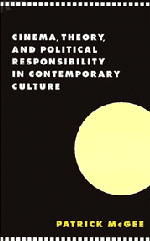Book contents
- Frontmatter
- Contents
- Preface
- Acknowledgments
- List of abbreviations
- 1 Redeeming contradictions: from critical theory to cultural studies
- 2 Art as the absolute commodity: the inter-subjectivity of mimesis in Adorno's Aesthetic Theory
- 3 Sexual nations: history and the division of hope in The Crying Game
- 4 Deconstruction and responsibility: the question of freedom in the place of the undecidable
- Bibliography
- Index
4 - Deconstruction and responsibility: the question of freedom in the place of the undecidable
Published online by Cambridge University Press: 06 July 2010
- Frontmatter
- Contents
- Preface
- Acknowledgments
- List of abbreviations
- 1 Redeeming contradictions: from critical theory to cultural studies
- 2 Art as the absolute commodity: the inter-subjectivity of mimesis in Adorno's Aesthetic Theory
- 3 Sexual nations: history and the division of hope in The Crying Game
- 4 Deconstruction and responsibility: the question of freedom in the place of the undecidable
- Bibliography
- Index
Summary
What does criticism want?
What does it have to have to constitute a beginning? Does it have to want or be wanting as the condition of saying anything? Does the process begin with some form of absence?
Or at least with a difference?
I have tried to raise the question of the political in art in a context in which such a question is hardly novel. Yet I have raised the question of the political only to shortcircuit the question itself. If art cannot be politically correct, can it be political in any meaningful sense? To give an example, in her more negative reading of The Crying Game, bell hooks suggests that the film is “conservative- reactionary” by comparison with a more conventional Hollywood melodrama, The Bodyguard. The former suggests that transvestites and homosexuals in general hate women to the extent of battering and killing them, that heterosexual white men will surrender their homophobia and enter homosexual relationships with black men in order “to get that ‘down-home’ service only a ‘black female’ can give,” and that the world should just forget about the messages of recent race and gender theorists and become the exclusive domain of white heterosexual couples. Hooks implies that art can and should be politically correct, that content must take precedence over form in the determination of value.
- Type
- Chapter
- Information
- Publisher: Cambridge University PressPrint publication year: 1997



